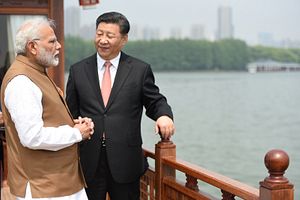Indian Prime Minister Narendra Modi is back in office for a second term with an even bigger mandate. But this also means that the expectations on him to deliver are that much greater, and foreign and defense policy are no exceptions to this. As New Delhi deals with a range of priorities, it will be important to keep an eye on its China challenge in the coming years.
On the foreign and security policy front, India faces several different challenges, from cross-border terrorism and insurgencies of varying magnitude to the rise of China. Ensuring a stable and secure neighborhood is, rightly so, an important priority for the new government, as has been evident even at the swearing-in ceremony of the Modi government (during his first swearing-in in 2014, Modi had invited the SAARC leaders, and, for his second one, the BIMSTEC leaders were invited as guests). Terrorism is also a critical issue given Pakistan’s behavior. In his address at the 5th CICA Summit in Dushanbe last week, new Minister of External Affairs S. Jaishankar said terrorism was “the gravest threat that we face in Asia today.”
Even though neighborhood and terrorism priorities are important, India also faces a serious strategic challenge from China. But on this front, New Delhi appears to be getting carried away by China’s efforts to woo India against the backdrop of Beijing’s growing trade frictions with Washington. As a scholar of the Indo-Pacific recently noted, “With Washington full of anti-China sentiment and an Indo-Pacific Strategy to match, prying India away from the US becomes increasingly important geostrategically for Beijing. And it’s doing pretty well so far—Wuhan spirit/reset has lasted over a year now.”
Modi’s foreign policy approach as far as China is concerned appears to be immersed in the 2018 Wuhan Summit. He is now preparing for a follow-up informal summit in Varanasi later in the year. On the sidelines of the Shanghai Cooperation Organisation (SCO) Summit, Modi held a separate bilateral meeting with Chinese President Xi Jinping, where Modi remarked “There has been much improvement in our relations since [the] Wuhan Informal Summit. We have also become sensitive to each other’s interests and concerns. We are also showing better understanding of each other’s stance.”
Indian Foreign Secretary Vijay Keshav Gokhale, briefing the media on the bilateral meeting, said that the meeting was a brief one but “very substantive and the atmosphere was very positive.” He underlined the fact that the Wuhan spirit was very much there and this is the beginning of a series of meeting between the two leaders, with the next meeting slated to be on the sidelines of the G-20 Summit in Japan. The two leaders will also meet for the BRICS Summit later in the year.
So far, Jaishankar’s induction as India’s foreign minister appears to have had little impact on India’s China policy. Certainly, China has been smart at throwing a few bones in India’s direction in a timely fashion, with China’s change of heart with regard to Masood Azhar just before the Indian elections being one case in point. It appears that there was a quid pro quo, possibly on the Belt and Road Initiative. While India is still opposed to it on account of the China-Pakistan Economic Corridor (CPEC), New Delhi appears to have softened its criticism. According to one Indian news report, India agreed not to raise objections to BRI in return for China dropping its hold on adding Azhar to a UN terrorism-based sanctions list.
In the face of the changing global balance of power dynamics, India’s foreign policy challenges will get even more daunting. But India’s foreign policy has to approach national security considerations with utmost pragmatism. New Delhi must realize that it has few long-term common interests with China, and that partnering with Beijing even for short-term gains carries considerable risks.

































